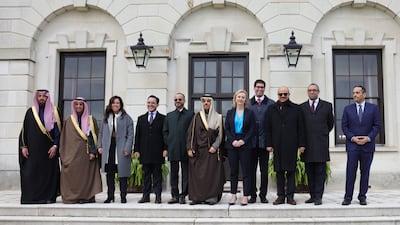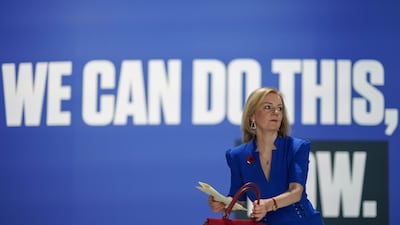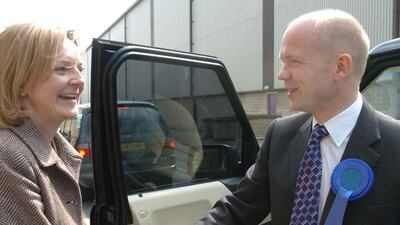Britain and the Gulf states have agreed to an “ambitious strategic partnership” after issuing a detailed joint communique late on Monday.
Following a day-long meeting between the British foreign secretary and foreign ministers from the Gulf Co-operation Council, a 1,500-word document was released detailing agreements on trade and numerous security issues including Iran and Afghanistan.
The discussions took place at the 17th-century mansion in Chevening, Kent, where the ministers announced that the UK-GCC relationship would “be strengthened across all fields”.
They highlighted the “re-energised UK-GCC partnership” that would help keep their citizens safe and generate significant business opportunities.
The agreement between the sides will prove a significant fillip for Liz Truss, the British foreign secretary, a day after it was announced she would lead Britain’s Brexit negotiations after the resignation of Lord Frost.
But it will also more importantly lead to the start of serious economic talks after all parties agreed to “work rapidly” towards a comprehensive free trade deal (FTA).
“They agreed that an FTA would mark a significant turning point in the UK-GCC relationship and looked forward to commencing negotiations in 2022,” the communique said.
A significant emphasis was also placed on developing security alliances as well as investment in clean technology, digital infrastructure and cybersecurity.
“The foreign ministers highlighted their belief that this ambitious strategic partnership between the UK and GCC member states is essential in promoting peace, security, stability and economic growth in the Middle East region and beyond,” the joint communique read.

Greater trade links between Britain and the Gulf would lead to organisations coming together, which would “promote understanding between our peoples”.
Despite the Omicron variant outbreak, the foreign ministers of Oman, Saudi Arabia, Qatar, Bahrain and Kuwait were present with the UAE represented by Assistant Minister for Political Affairs at the Ministry of Foreign Affairs and International Co-operation Lana Nusseibeh.
Earlier in the day, Britain and the Gulf States signalled they were “setting the stage of a new era” for economic ties.
Following talks with the GCC ministers, Ms Truss said an agreement was a “win-win for all parties".
“I want us to have much deeper links in key areas like trade, investment, development and cybersecurity with a part of the world that is important to Britain’s long-term interests,” she said.
It is understood that the British government wants to “modernise the relationship” with the Gulf, moving it on from the long tradition of security into the business world, with annual trade worth £30 billion.
”The UK is an important economic and strategic partner for the UAE, and for our GCC neighbours. The UAE alone accounts for 30 per cent of UK exports to the Arab world”, said Lana Nusseibeh, UAE Assistant Minister for Political Affairs. “We had a very productive set of discussions here in Chevening about how to build on these strengths and deliver added benefits to people and businesses in Britain, the Gulf, and beyond based on our mutual prosperity and security”, she added. “On the international stage, we are looking forward to working with the UK on our shared priorities when we join the UN Security Council in January.”
A series of high-level visits to the region over the next year will be used to further cement Britain's GCC relationships and help to move the trade deal along.
The UAE's ambassador to the UK, Mansoor Abulhoul, described the meeting as “another sign of the UK-GCC relationship going from strength to strength". He added that "the UAE’s Sovereign Investment Partnership this year was a major landmark in our own relationship with the UK, and next year will bring the Strategic Dialogue between [UAE Minister of Foreign Affairs and International Co-operation] Sheikh Abdullah bin Zayed and Foreign Secretary Liz Truss. A Free Trade Agreement would be yet another big step forward. We are investing together in developing countries".
Aside from trade, the communique addressed a number of pressing security issues around the region, including Iran and Yemen.
Iran
The continuing concerns over Iran were at the top of the security agenda, with the ministers warning Tehran that the current talks in Vienna focused on renewing the nuclear deal was a “last opportunity” to restore regional security and avoid escalation.
“Ministers urged Iran to seize the current diplomatic opportunity to restore the JCPOA [Joint Comprehensive Plan of Action] now to avoid bringing the region and international community to a crisis point,” they said.
There was also “grave concern” over the “escalation in Iran’s destabilising activities in the region. The communique called on the new Iranian administration “to play a positive regional role, abide by international norms, respect their neighbours’ sovereignty and territorial integrity, and refrain from supporting militant groups".
Afghanistan
On Afghanistan, there was general alarm over the unfolding humanitarian crisis, and the ministers said it was vital that the international community responded “urgently to the needs of the people of Afghanistan”.
They also underscored the importance of the Taliban meeting their commitments on counterterrorism, “not allowing any terrorist organisation to train, organise or fundraise in Afghanistan, as well as the importance of preventing foreign fighters from entering the country".
Iraq
Turning to Iraq, the ministers stated there was a shared vision for stability and prosperity but they needed to prevent the expansion of violent extremists, including ISIS. They also condemned the attempted assassination of Iraqi Prime Minister Mustafa Al Kadhimi.
They noted the need to form a stable government following the recent elections.
“The ministers welcomed the growing GCC-Iraq strategic partnership and Iraq’s increased regional integration,” they added.
Yemen
The ministers said there was an “urgent need” for a political resolution in Yemen, with negotiations enabled by the UN. These should take into account the GCC Initiative and its implementation mechanism.
It was necessary to prevent the resupplying of weapons to the Houthi rebels in contravention of UN Security Council resolution 2216.
“Given the seriousness of the humanitarian crisis, they agreed that maintaining direct humanitarian and development support to the country was essential, including protecting the safety of humanitarian workers,” the communique said.
The ministers also strongly condemned the Houthis’ repeated attacks against civilians in Saudi Arabia and Yemen.
Syria
There was deep concern over the “dire humanitarian situation” in Syria, with an agreement that life-saving assistance must be provided across the country alongside the UN humanitarian response plan.
Libya
All foreign fighters, forces and mercenaries needed to be withdrawn from Libya “without delay”, the ministers declared, also voicing their support for UN efforts towards “credible” elections starting on December 24.
The ministers also renewed their call for all Libyan political actors “to refrain from actions that undermine the political process and to adhere to the election results”.
Climate Change
Britain recognised the commitment on climate change made by GCC member states at the recent Cop26 meeting in Glasgow, including the announcements made to reach net-zero emissions.
The UK also commended Saudi Arabia on the leadership it showed in the launch of the Middle East Green Initiative and the GCC commitment to transparent collaboration in its implementation.
Ms Truss also congratulated the UAE on winning the bid to host Cop28.
Mr Abulhoul said: "We are fighting climate change - the UK with Cop26, and the UAE with Cop28. This is a relationship that is good for the GCC, good for the UK, but also good for the world.”
“These are important signals to the global community about the region’s intent to take action and protect the environment for future generations,” the communique concluded.
The ministers expressed their support for the fifth UN Conference on the Least Developed Countries (LDC5) in January 2022 in Qatar.














